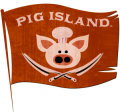Bar and restaurant owner Max Toste has been an important figure in the craft beer, craft cocktail and Mexican food scenes in Boston for over a decade. When we started planning Bowl of ‘Zole Boston, we knew that we needed him on our team. We talked to Max about his history in the industry, his love of mezcal and what he’s planning on bringing to Bowl of ‘Zole this April. You can visit Max at Lone Star Taco Bar in Allston or Cambridge. Be sure to get your tickets to BoZ Boston so you can try Max’s exclusive creations for the event.

Food Karma: How did you get into food and restaurants in the first place?
Max Toste: I grew up really loving food. As a kid, my grandparents were both very good cooks. My grandfather was a good cook, which was unusual for a Portuguese man of that generation. I was either going to be a touring musician or a chef when I grew up, that was my plan. I ended up choosing music and I did have a long music career, relatively speaking, but ultimately my creative outlet was always cooking.
I started working in restaurants to supplement my music career in 1994, so it’s been a few years. I cooked in restaurants, I worked as a barback and a busboy and a waiter and then as a bartender. I worked in fine dining French restaurants, I worked in steakhouses, kind of worked all over the place. Then I didn’t work in restaurants for a few years because I was making money playing music.
When I eventually came back to restaurants, it was with a bit more focus on the fact that food really became my creative outlet more than music. I just got really serious about it, and craft beer was a real interest of mine. I got into wine pretty young in the ‘90s, but wine is a steeper learning curve and it’s more expensive. When I got into craft beer, I was wowed that I could drink the greatest beers in the world and they’re like three bucks for a bottle at the liquor store, I could afford that.
Through craft beer and my love of cooking, I got interested in running a bar. I was working at a beer bar but we had a liquor license so I put together a little cocktail menu with some classic cocktails that I liked and had learned to make when I was working at an old French restaurant and just kind of took off from there. There was this really new cocktail scene in Boston around 2003, and it was influenced by what was going on in New York around the same time.
For me, cocktails and cooking had a lot in common: understanding what your ingredients are and understanding flavor at the same time. In Boston, everybody was making the same drinks the same way. If it was written in a cocktail book, that’s how you had to do it. So when my business partner Aaron and I opened our bar Deep Ellum, the idea was I was going to do cocktails more my own way. There were a few guys in town doing that, some of the early cocktail slingers in Boston, but it was still kind of a new idea, which is hard to believe now.
I looked at it like cooking: I want things to taste a certain way and I don’t like sweet things very much and I like savory flavors. It really kind of dawned on me as I was reading old cocktail books that came from different places and different time periods because they had drinks that had the same name, for instance a Manhattan in a 1930’s cocktail book versus a Manhattan in the Savoy cocktail book or in a 1960’s publication, it has the same name but one of them uses bourbon, one of them uses rye, the new orleans one use Peychaud’s, the newer recipe might have Canadian Club. Depending on where and when in the world you are, flavors can change and palates can change. You’re not required to make something a certain way, it’s more about general idea.
I wasn’t going to mix rye whiskey, sweet vermouth, bitters and a twist and call it “Max’s Martian Milkshake,” it’s still a Manhattan, but the proportions and the type of bitters you can tweak. That’s the approach we took to cocktails. What led me down the path to really get into spirits was trying to make good cocktails using the best spirits I could find. When we opened Deep Ellum, we didn’t sell any of the big brands. I wanted to find things that tasted the best. Some of those were well known brands and some of them weren’t, it just was a matter of what I liked the best and what made the best drinks.
About 2008, this guy walks into my bar and asks if I wanted to try some mezcal. I didn’t even know what mezcal was. That’s when I first tasted mezcal, and it just blew my mind. I was always a tequila fan and I had traveled in Mexico in the past before that. I had a bit of the agave bug, but when I tasted mezcal I was amazed.
It took us a long time to get other people to drink it. The first six bottles of Del Maguey, I’m pretty sure I didn’t sell a drop of it. I either gave it all away or drank it myself because I couldn’t sell it to anybody, they didn’t know what it was. We were very early on in mixing with mezcal. Ten or twelve years ago we were using it in spirits to add smokiness. I would do a lot of split based cocktails where I’d use half reposado and half mezcal to build drinks to kind of trick people into drinking mezcal. That was also my technique when I opened Deep Ellum; I was just trying to trick everyone into drinking gin because gin wasn’t very popular at the time.
We opened Lone Star Taco Bar next to Deep Ellum because we had a chance to expand but we didn’t really want to just expand the space. We thought it would be cool to do a little salon cafe kind of thing next door. You can take advantage of your liquor license and open a restaurant next to your restaurant as long as you connect it by the kitchen and the dining room.
I wanted to focus on agave spirits. The chef at Deep Ellum and I collaborated and wrote this whole menu based on our favorite stuff and things that I had eaten in my travels. We wanted to make our own tortillas fresh because nobody was doing that. There was really just no good Mexican food in Boston at the time. I wanted to do street food: everything was a la carte, you order singles of everything you want, it comes out as it’s ready. The whole tapas style service confused a lot of people because they were used to sombreros on the wall and everything was covered in melted cheese and we were doing something a little different.
I figured people would either get it or they wouldn’t. It was a very small space, only 40 seats, so I didn’t have to fill a 250 seat cavernous restaurant. All I had to do was to get 40 people to get it at a time. It worked out pretty good. Then we opened another one across the river in Cambridge because it was so successful.
It’s been a labor of love and a passion. It’s not hard to do stuff when you’re really into it. I met Arik from Fidencio years ago through Deep Ellum because we were selling his brand. That was over ten years ago when he came to the Boston market. We hit it off and we’ve stayed in touch over the years.

FK: Have there been any events like Bowl of ‘Zole in Boston?
MAT: No. When I heard about Bowl of ‘Zole from Arik a year ago, I thought it would be super cool. There’s been nothing like that in Boston. Spirit tastings used to be more popular, but a lot of the big houses just stopped doing them even before covid.
I also really love pozole. I thought it was a cool idea and I was very happy to try to get as much interest in the Boston scene as I could. It’s small, but there’s quite a good community of people who are really into this stuff, and there haven’t been a lot of opportunities for us to communicate with each other as opposed to just bumping into each other here and there. I’m excited about the idea of all the people who own cocktail bars and are in the cocktail scene coming together.
We all knew each other, and there was a lot of mutual respect and collaboration. It wasn’t super competitive, which I liked and coming from the craft beer scene. That scene was much more competitive. Everyone wanted to have the stuff nobody else could get. It was kind of lame. With the cocktail crowd, everybody was much more supportive. Nobody felt like they were inventing something because everybody knew that it already existed. There was less ego attached to it for the most part.
I like to think the sort of people who love mezcal are kind of the same way, we’re all just really into it. I like the idea of Bowl of ‘Zole being an opportunity for everybody to come to get to know each other better and to create a scene that’s supportive and can help perpetuate this thing that we all like and more importantly get consumers a little more educated.

FK: What has been the biggest obstacle in getting people to embrace mezcal, and how has that changed over your years of serving it besides greater awareness?
MT: I don’t really look at it as an obstacle because for us, I wanted to have it and I wanted to try to educate people about it because it was yummy and it went with the food. I think other people in Boston liked mezcal at the same time as I did and they tried to sell it at their bars, too. The big difference was having Lone Star Taco Bar. The food made it a lot easier to sell an agave spirit to someone hanging out at the bar than it was at Deep Ellum where we had a gastropub kind of vibe. We didn’t sell a lot of mezcal there because it didn’t go with the food as much. I think the struggle for a lot of bars in Boston was just the association of what it pairs with and embracing it as a spirit on its own as opposed to just a cocktail ingredient that makes a cool cocktail.
One thing that does deter people is that it can be kind of cost prohibitive to try something they don’t know. We offer one ounce pours of things so you can try stuff without it being such an investment. That’s actually really helped the staff turn people on to different things or to get somebody who always drinks the same thing to try a different mezcal or different tequila.
I think flights are annoying. I understand why people do them, I know why people like them, but I still think they’re annoying. I don’t want to do homework at the bar! I want to be able to try different stuff and I want to be able to sell people stuff that they haven’t had without feeling like we’re taking them for something. I understand why people do flights, I just prefer to offer smaller portions in addition to larger portions so that people can try stuff.
When you go to Austin, every bar does that. In California, every bar that sells good mezcal does it. It’s so common in other markets, and when I started doing it at Deep Ellum and Lone Star about five years ago, it was so weird. People didn’t get what we were doing or why we were doing it. My staff also didn’t get it, but is it really that complicated? It has really helped sell all the mezcal rather than having people stick with the one mezcal they’ve heard of and never taking a risk.
The other thing is, we don’t really market ourselves as some kind of mezcal tasting room. We sell a lot of margaritas, we sell a lot of food, it’s a fun place to hang out, and we happen to have mezcal that’s yummy. I don’t necessarily need to charge quite as much as other people do. We’re trying to keep the price down a little bit. We’re not a charitable organization but we have the luxury. Our business plan is that we charge a little bit less for things because we want people to try them out and enjoy them and hopefully buy them in quantity and come back.
To the first part of your question, challenges early on were just explaining to people what mezcal was. People wanted to know is it smoky, why is it smoky, is there a worm in it, all that kind of stuff. I think in the last few years, people know what it is. They might not really know what it is, but at least they’re familiar enough that it’s not completely foreign.
I think the biggest challenge actually is getting people to try mezcal who think they don’t like it because they either don’t like it or they just tried one stylistically that isn’t necessarily their bag. If you don’t like super big, smoky, high toned, green mezcal styles, you might like a pechuga or you might like some of these pechugas that are made without animals, the vegan pechugas or some kind of agave con frutas. They’re very fruity and they’re very approachable, so we often encourage people who don’t think they like mezcal to try one of the less expensive pechugas. They’re usually distilled three times and they have the addition of the fruit in the third distillation so they tend to be a lot softer and they’re less smoky. That’s been a thing where we’ve tried to take advantage of different styles to try to turn people on to stuff that they don’t think they like.
FK: What’s your relationship with pozole?
MT: I’ve always really enjoyed it. The way our kitchen is set up at Lone Star, we don’t really have a way to sell it because everything is picked up off a flat top griddle. Personally, I have made it a few different ways at home and I have enjoyed it in Mexico and all over California and Texas. I had some the other day that was quite good from a place in Somerville called Barra. I lived in Los Angeles when I was a kid, and hominy corn was something that I liked when I was younger, but I don’t have a ton of experience selling it professionally.
I had my folks over this summer and I wanted to make something that my vegetarian father could eat that everyone would enjoy. I ended up making a spread of Mexican food including a pozole using sweet corn instead of meat. I used the corncobs. I shucked them and cooked them with a bunch of roasted vegetables and that was the broth. I used guajillo and ancho chilis pureed to flavor the broth as well. Then, I cooked the pozole in a pressure cooker with just onion, garlic and bay leaf. I put the fresh corn in the finished product and season it on top almost like elote street corn. I made an aioli with ancho chili and then had cabbage, radishes and cotija cheese on the top. It’s kind of pozole flavored like elote and it’s vegetarian. It’s actually vegan if you leave the cheese off.
That was really yummy, so I was thinking about doing that for BoZ. I know my friend Felipe from Felipe’s, he’s from Mexico and he’s gonna make his super traditional situation. The ladies who own Barra are from Mexico City and they’re gonna do a traditional pozole with guajillo and chicken. With a bunch of bubbling pots of meat soup, I thought it would be cool to make something different.
I have another place that I’m opening in Portland, ME with my old chef Ryan that’s gonna be a little more seafood centric. We’re thinking of doing a seafood salad slash aguachile ceviche inspired situation using the pozole for the texture, not as a soup. We also want to do something different.
